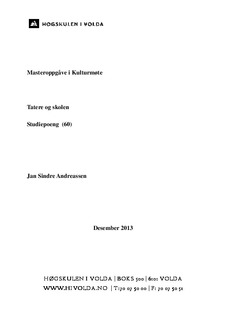| dc.contributor.author | Andreassen, Jan-Sindre | |
| dc.date.accessioned | 2015-04-20T11:30:07Z | |
| dc.date.available | 2015-04-20T11:30:07Z | |
| dc.date.issued | 2013 | |
| dc.identifier.uri | http://hdl.handle.net/11250/282088 | |
| dc.description.abstract | Summary
The national minority “Travellers and school”, is the topic of my thesis. There has been research on the people since pioneer and social scientist Eilert Sundt first began to take an interest in them in the mid-1800s. Especially the last twenty years there has been an increase in the interest of national minorities in Norway, such as Travellers. In at least five centuries, these people have lived in Norway and attempts have been many to try to integrate the people. Such integration requires a determination of the integrated party to be integrated. And here are my findings equivocal. Travellers want to be regarded as "one hundred percent" Norwegian, yet they are clear that they are in many ways very different from "the others". The school is the arena in the egalitarian Norway, which is best suited to represent the integration process. It's still been seen as a paradox that Travellers "need" to undergo some kind of integration process after five hundred years in the country. It bears witness to a people who have a strong internal culture to stand out and preserve their traditions. A people who see themselves as different and to some degree strongly want to be. The society around will also perceive Travellers as different. It looks as if the theoretical knowledge is disregarded in favor of the practical teachings. Although the Travellers say they feel school is important, suggests the practice and their actions to the contrary. Absence rate is too high. Education is essential to have the opportunity to participate in society. Lacking of it is likely to exclude people from society. The parents say that they understand this, but still do not manage to motivate their children for schooling. Some parents express a clear distrust and fear of authorities. The school is also an authority. Individual experiences are transferred to the next generation and help to shape both the parents and the children's views on whether the school is important. This transferred collective memory must be processed and be overcome if schools are to succeed with children of Travellers. Opportunity for praise and positive feedback are important motivators in their schoolwork. This can only be done with a safe environment and sense of security built up over time. My issue is twofold and therefore the conclusion must also be twofold. Taters experiences with the school situation are mostly positive. Parents expressed appreciation to the efforts they experience school does for their children. They know they are lucky with this school. The school also expresses optimism on Travellers behalf. They see that they have managed to create security and good relations with the families and they also feel they have a certain degree of continuity. My assignment also tries to look at the fact that the school and parents I study are communicating better than most of the other schools. And therefor are better off and better equipped to succeed in their goal for education for the future Travellers. | en |
| dc.language.iso | nob | nb_NO |
| dc.publisher | Høgskulen i Volda | nn_NO |
| dc.subject | tatarar | nn_NO |
| dc.subject | romanitalande elevar | nn_NO |
| dc.subject | skolefråvere | nn_NO |
| dc.subject | skolefravær | nb_NO |
| dc.subject | tilhøvet heim -skole | nn_NO |
| dc.subject | kunnskapsoverføring | nn_NO |
| dc.subject | skolemiljø | nn_NO |
| dc.subject | skolehistorie | nn_NO |
| dc.subject | kollektivt minne | nn_NO |
| dc.subject | skoletrivnad | nn_NO |
| dc.title | Tatere og skolen. En studie av forholdet mellom tatere og skolen. Hva er taternes og skolens erfaringer med skolesituasjonen for elever med taterbakgrunn? | nb_NO |
| dc.type | Master thesis | nb_NO |
| dc.subject.nsi | VDP::Social science: 200::Education: 280::Other disciplines within education: 289 | en |
| dc.subject.nsi | VDP::Social science: 200::Social anthropology: 250 | en |
| dc.source.pagenumber | 101 | nb_NO |
| dc.subject.keyword | Minority Groups | en |
| dc.subject.keyword | Language Minorities | en |
| dc.subject.keyword | Migrants | en |
| dc.subject.keyword | Ethnic Groups | en |
| dc.subject.keyword | Cultural Background | en |
| dc.subject.keyword | Educational History | en |
| dc.subject.keyword | Attendance | en |
| dc.subject.keyword | Educational Environment | en |
| dc.subject.keyword | Student Welfare | en |
| dc.subject.keyword | Family School Relationship | en |
